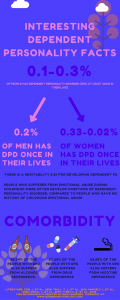Dependent personality disorder diagnosis:
A dependent personality disorder diagnosis can help people with dependent personality disorder (DPD) to find proper treatment for their issues. People with dependent personality disorder are preoccupied with a fear of abandonment, are easily hurt by criticism or disapproval, and avoid taking responsibility for tasks, projects, and decisions. This makes people with DPD very dependent of someone else, and can result in tolerating others to emotionally, sexually, and physically abuse them as long as they also get support and nurturance from that person. Having a dependent personality disorder diagnosis helps people understand why they behave the way they do and teaches them how to change their behaviour.
Because of the risk of getting dependent on the therapist, psychotherapy for dependent personality disorder should be as short as possible. This is contrary to most other personality disorder treatments, where long-term treatments are more effective than shorter ones. Another important note to keep in mind: in order to get a proper dependent personality disorder diagnosis some other mental disorders need to be ruled out, such as borderline personality disorder and histrionic personality disorder.
Here is a list of the dependent personality disorder symptoms as listed by the DSM V.
Jump to:
- What is dependent personality disorder?
- What causes people to develop DPD?
- What are DPD treatment options?
- The dependent PD test.
- How to cope with DPD?
- Living with someone who has DPD.
- Interesting dependent PD facts.
- Online counseling for Dependent PD.
- Take me to the homepage.
At Barends Psychology Practice, we offer (online) therapy for dependent personality disorder. Contact us to schedule a first, free of charge, online session. (Depending on your health insurance, treatment may be reimbursed).
Dependent personality disorder diagnosis – the symptoms
Someone with a dependent PD has a pervasive and excessive need to be taken care of. This need to be taken care of leads to clinging and submissive behavior and fears of separation. Usually, this begins by early adulthood and is present in a variety of contexts, as indicated by five (or more) of the following:
(1) The person has difficulty making everyday decisions without a disproportionate amount of reassurance and advice from others. This means that someone with dependent personality disorder feels a lot of insecurity, doubt, and anxiety when he or she needs to make an everyday decision, and that is why they (repeatedly) ask others around them for reassurance and advice.
(Advertisement. For more information, please scroll down.)
(2) For most major areas of his or her life the person needs others to assume responsibility. Someone with dependent personality disorder experiences a lot of stress and anxiety when facing life changing decisions, because they are afraid others may disapprove of their decision, and because they are afraid to make the ‘wrong’ choice.
(3) The person has difficulty expressing disagreement with others because of an unrealistic fear of loss of support or approval. Just like everyone around you someone with dependent personality disorder has an opinion of their own. But they don’t dare to share their point of view, unless they are sure others share the same opinion. If people have a different opinion, they keep theirs for themselves, for the sake of not losing approval or support.
(4) He or she has difficulty initiating projects or doing things on his or her own. This is not because of a lack of motivation or energy, but because of a lack of self-confidence in judgment or abilities. Starting projects, or tasks is difficult for people with dependent PD, because they are afraid to make mistakes or to get criticism of others around them. They don’t dare to trust their own creativity, skills, and abilities, so it’s safer for them to wait for others to start.
(5) The person goes to excessive lengths to obtain nurturance and support from others, to the point of volunteering to do things that are unpleasant. Suffering emotional, physical, and sexual abuse is acceptable for someone with dependent personality disorder as long as these abusive people give nurturance and support.
(6) He or she feels helpless or uncomfortable when alone because of exaggerated fears of being unable to care for himself or herself. For someone with DPD being alone means to have to take care of themselves. And this is difficult, because they don’t trust their own abilities and judgment.
(7) The person urgently seeks another relationship as a source of care and support when a close relationship ends. Someone with DPD has a pervasive need to be taken care of. Being alone makes them feel very insecure and upset; feelings they really don’t like.
(Advertisement. For more information, please scroll down.)
(8) He or she is unrealistically preoccupied with fears of being left to take care of himself or herself.
NOTE: Dependent personality disorder must be present for more than 6 months and can’t be diagnosed if the person meets the criteria of borderline personality disorder or histrionic personality disorder.

